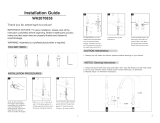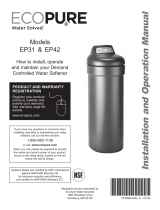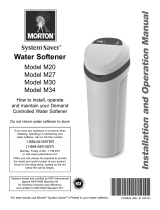GE GXSF30V is a water softener that provides conditioned water for the entire home, preventing scale buildup and improving the taste, feel, and efficiency of water usage. It has a compact design, allowing for easy installation in various locations, including basements, garages, and utility rooms. The GXSF30V operates on a demand-initiated regeneration cycle, ensuring efficient water and salt usage. It features a digital control panel for easy programming and monitoring of system status, including water usage and remaining salt levels.
GE GXSF30V is a water softener that provides conditioned water for the entire home, preventing scale buildup and improving the taste, feel, and efficiency of water usage. It has a compact design, allowing for easy installation in various locations, including basements, garages, and utility rooms. The GXSF30V operates on a demand-initiated regeneration cycle, ensuring efficient water and salt usage. It features a digital control panel for easy programming and monitoring of system status, including water usage and remaining salt levels.












-
 1
1
-
 2
2
-
 3
3
-
 4
4
-
 5
5
-
 6
6
-
 7
7
-
 8
8
-
 9
9
-
 10
10
-
 11
11
-
 12
12
GE GXSF30V is a water softener that provides conditioned water for the entire home, preventing scale buildup and improving the taste, feel, and efficiency of water usage. It has a compact design, allowing for easy installation in various locations, including basements, garages, and utility rooms. The GXSF30V operates on a demand-initiated regeneration cycle, ensuring efficient water and salt usage. It features a digital control panel for easy programming and monitoring of system status, including water usage and remaining salt levels.
Ask a question and I''ll find the answer in the document
Finding information in a document is now easier with AI
Related papers
Other documents
-
 Whitehaus Collection WH2070838-BN Installation guide
Whitehaus Collection WH2070838-BN Installation guide
-
North Star NSR 17CS Operating instructions
-
 ECOPURE EP31 Installation guide
ECOPURE EP31 Installation guide
-
North Star NSC42 Installation guide
-
Eco Pure NSC42 Specification
-
Whirlpool WHES40 User guide
-
EcoWater ESD2750 & ESD2752 Owner's manual
-
 Morton M340012 Installation guide
Morton M340012 Installation guide
-
Whirlpool WHES30E User manual
-
Whirlpool WHES48 User manual














